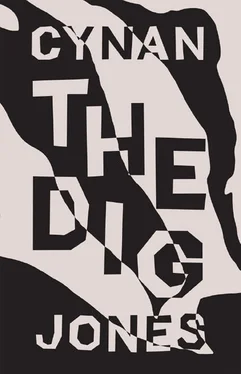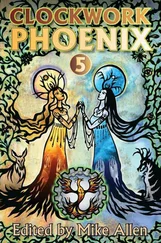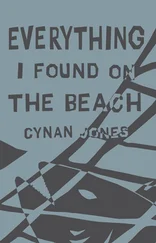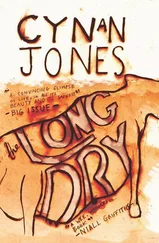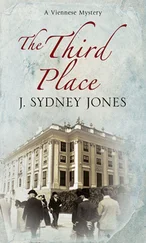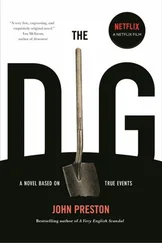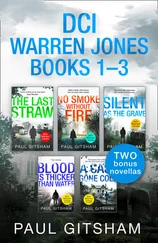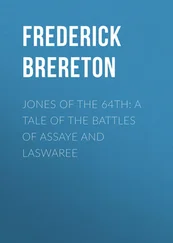I’ll start her tonight, he said to himself.

When they got back to the yard after taking the badger it was gone midday. The boy was exhausted and tired. The boy had been expecting the same kind of flurry as ratting and he was in shock at the monotonous graft of the dig.
How’s the dog? asked the big man.
The boy’s father picked up the big Patterdale and looked at his throat and chin. There was a glancing scratch underneath its jaw and a little way back was a tear some two or three inches long that had bled all down the dog’s front. The dog seemed unperturbed.
Stitches? asked the gypsy.
Aye, said the boy’s father. He lifted the cut flap of skin up, peeling it from its own blood, and holding the dog more firmly as it bridled. The blood had soaked into the rough coat and it was jammy.
There’s nothing cut, he said. The dog’s artery was a fraction above the cut and he could see it pump thickly through the dog’s skin.
The big man had not put the badger down at all and when he put the sack in the back of the van he swore once, succinctly, at the release of weight.
They uncoupled the dogs and let them sort themselves out and the boy watched his pup work over a log pile with the other dogs. They were frantic with the scent of rats the big man had driven out the day before.
The boy was ratty and awkward himself and he watched his pup with a proudness, thinking of the mink the big man had given him. It had given him a teamship with the big gypsy.
What’s for him? said the boy’s father. He nodded at the sack in the van. Behind the big gypsy the farmland looked wider and tamer without the mist. You could hear the tractors work somewhere again on the land.
I’ll take him somewhere, he said.
He divided up the money that the magistrate farmer had given them for getting rid of the badger. He did not mention the other men, nor the five hundred pounds they were paying for the big forty-pound boar.
When the others had gone, he pushed the sack to the back of the van and carried over some straw bales that he put in the back hiding the badger. He thought of leaving the tools and coming separately back for them but then thought, Ag. If they look in the van they’ll find it anyway. Just the badger was enough to send him down.
He drove home without incident though and got the dogs from the van and unloaded the bales and took the badger and dumped it in the sack in the coal bunker. Then he went in and called the men. They said they’d be ready for it that night and they gave him a time and directions. It was about three in the afternoon. Ag, he thought. He figured on getting some rest.

THE BLACK LAMB looked tired and beaten under the lamp.
It had not put on weight and he could make out the fingers of its ribs with the bloated milk-full stomach behind them. It was folded in the bottom of the box, but not with the folded comfortable way of a sleeping cat, more with the weak compliance of something sick beyond will.
Daniel picked up the small black lamb. His father would have simply dashed its head on the barn floor. He was not a hard man, but a pragmatist; but that kind of will wasn’t in Daniel. Despite the lamp the lamb felt cold, as if it could generate no heat of its own, and it was too light for itself and hung limply. It was as if he’d picked a jumper from the floor. It had a completely will-less passivity.
I don’t expect this of you, he said. I just want you to understand it. Sometimes you have to choose between a quick misery or a slow misery. He heard his father talking, saw him take the useless lamb from the box. You have to understand it as an option. There was a movement and the lamb hung dead from his father’s hand, a thin spittle of blood reaming from its mouth.
He heard the voice again. Heard his father, that there were the two miseries, and somewhere in him a vicious voice told him that his wife had no fear now of the worse, drawn-out misery that might have come. Hers had been the quick misery, the head dashed against the barn floor. He thought of his father stricken, becalmed by the stroke. He ignored the vicious little voice, as if it was something overheard he had no wish to know.
He rubbed the lamb, trying to bring some warmth into its muscles, the wrinkles of the loose skin riding under his hand like rolls of sock. There was the superstition that every flock should have a black lamb to sacrifice should the Devil come and it was to Daniel like the lamb was a victim of this.
He felt the lamb’s heartbeat under his hands. It was faint. A bare registry.
You need to live, he thought.
He picked up the lamb and carried it into the house.
He put it down in the porch and took off his boots and then went in and found a box and came back for the lamb.
He opened the door of the Aga and took out the racks. He hadn’t cooked in it since she had died. There was just the residual automatic heat of it running and he took out the racks with unprotected hands and felt inside the oven space. Then he put the lamb in the box in the Aga, leaving the door open, and went back outside.

The policeman opened the door, looked at the deep mud of the yard, and got deliberately out.
Set back from the window, the man watched him through the gap in the curtains. He watched him scan the place. The policeman was young and he was not a policeman the big man had seen before.
The policeman bent through the car door and pushed the horn twice.
What do I do here? thought the man. He wished he’d left one of the big dogs off but knew even through the coal it would scent the badger and bother it. If I stay in the house, he’ll start looking round, thought the man. Ag.
The policeman had started to walk toward the house from the car and the big man came out.
Afternoon, sir. It’s clearing up, the policeman said. The policeman looked at the man and looked out as if at the weather over the valley.
The big man just nodded.
Few questions, really, sir. The policeman was light and inoffensive the way they are and the man moved to bring him away from the house.
Can you tell me what you were doing last night, or early this morning?
The big man didn’t reply.
The policeman looked around at the yard and privately noticed the two sets of tire tracks that were cut into the mud and that were not filled with overnight rain. He saw the old red van and guessed one set belonged to that. The policeman took in the many dumped engines and tires and the wastage of vehicles and machines about.
We’ve had a report of fly-tipping. He waited. I just wanted to ask whether you would know anything about that.
What did they tip? asked the man.
The policeman didn’t respond. He was looking at the junk and the big man saw and said, Does it look like I throw things away?
Just wondered if you could help, sir, said the policeman.
Somebody pointed at me, said the man. The two men stood in the yard.
The policeman could sense the man was guilty of something but knew he had not been tipping. He was suddenly aware of his singleness at the place. He knew the man had past firearms offenses and way back some assault. He didn’t respond to the man, using the silence instead.
I was here last night. Asleep.
The policeman smiled. We had quite some rain, didn’t we. Kept the kids awake, he said. He felt this horrific electricity coming off the man. The policeman was smiling but he thought briefly and preciously of his kids.
Читать дальше
